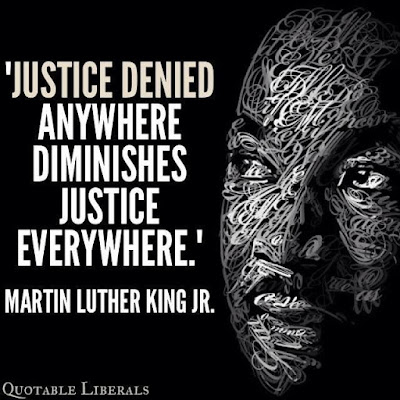World Day of Social Justice is a day recognizing the need to promote efforts to tackle issues such as poverty, exclusion and unemployment.
Many organizations, including the UN and the International Labour
Office, make statements on the importance of social justice for people.
Many organizations also present plans for greater social justice by
tackling poverty, social and economic exclusion and unemployment. The United Nations General Assembly
has decided to observe 20 February annually, approved on 26 November
2007 and starting in 2009, as the World Day of Social Justice.
As recognized by the World Summit, social development aims at social
justice, solidarity, harmony and equality within and among countries and
social justice, equality and equity
constitute the fundamental values of all societies. To achieve “a
society for all” governments made a commitment to the creation of a
framework for action to promote social justice at national, regional and
international levels. They also pledged to promote the equitable distribution of income
and greater access to resources through equity and equality and
opportunity for all. The governments recognized as well that economic
growth should promote equity and social justice and that “a society for
all” must be based on social justice and respect for all human rights
and fundamental freedoms.Social justice is an underlying principle for
peaceful and prosperous coexistence within and among nations. We uphold
the principles of social justice when we promote gender equality or the
rights ofindigenous peoples and migrants. We advance social justice when
we remove barriers that people face because of gender, age, race, ethnicity, religion, culture or disability.
For the United Nations, the pursuit of social justice for all is at
the core of our global mission to promote development and human dignity.
The adoption by the International Labour Organization
of the Declaration on Social Justice for a Fair Globalization is just
one recent example of the UN system’s commitment to social justice. The
Declaration focuses on guaranteeing fair outcomes for all through
employment, social protection, social dialogue, and fundamental
principles and rights at work.
The General Assembly proclaimed 20 February as World Day of Social
Justice in 2007, inviting Member States to devote the day to promoting
national activities in accordance with the objectives and goals of the
World Summit for Social Development and the twenty-fourth session of the
General Assembly. Observance of World Day of Social Justice should
support efforts of the international community in poverty eradication, the promotion of full employment and decent work, gender equity and access to social well-being and justice for all.
DEPARTMENT OF SOCIAL JUSTICE AND EMPOWERMENT IN INDIA (SAMAJIK NYAYA AUR ADHIKARITA VIBHAG)
The Department of Social Justice and
Empowerment is the nodal Department for the overall policy,
planning and coordination of programmes for the development of the
groups mentioned. However, overall management and monitoring etc. of the
sectoral programmes in respect of these groups shall be the
responsibility of the concerned Central Ministries, State Governments
and Union Territory Administrations. Each Central Ministry or Department
shall discharge nodal responsibility concerning its sector.
- The following subject which fall within List III - Concurrent List of the Seventh Schedule to the Constitution:
Nomadic and Migratory Tribes. - To act as the nodal Department for matters pertaining to the following groups, namely:-
(i) Scheduled Castes;
(ii) Socially and Educationally Backward Classes;
(iii) Denotified Tribes;
(iv) Economically Backward Classes; and
(v) Senior Citizens. - Special schemes aimed at social, educational and economic empowerment of the groups mentioned at (i) to (iv) under entry 2 above, e.g. scholarships, hostels, residential schools, skill training, concession loans and subsidy for self-employment, etc.
- Monitoring of Schedule caste sub plan.
- Rehabilitation of Manual Scavengers in alternative occupations.
- Programmes of care and support to senior citizens.
- Prohibition.
- Rehabilitation of victims of alcoholism and substance abuse, and their families.
- Beggary.
- International Conventions and Agreements on matters dealt within the Department.
- Awareness generation, research, evaluation and training in regard to subjects allocated to the Department.
- Charitable and Religious Endowments and promotion and development of Voluntary Effort pertaining to subjects allocated to the Department.
- The Protection of Civil Rights Act, 1955 (22 of 1955).
- The Scheduled Castes and the Scheduled Tribes (Prevention of Atrocities) Act, 1989 (33 of 1989), (in so far as it relates to the Scheduled Castes, excluding administration of criminal justice in regard to offences under the Act).
- National Commission for Backward Classes Act, 1993 (27 of 1993).
- The Maintenance and Welfare of Parents and Senior Citizens Act, 2007 (56 of 2007).
- National Commission for Scheduled Castes.
- National Commission for Safai Karmacharis.
- National Commission for Backward Classes.
- National Scheduled Castes Finance and Development Corporation.
- National Safai Karamcharis Finance and Development Corporation.
- National Backward Classes Finance and Development Corporation.
- National Institute of Social Defence.
- Dr. Ambedkar Foundation.
- Babu Jagjivan Ram National Foundation
- National Commission for Denotified and Semi-Namadic Tribes




No comments:
Post a Comment